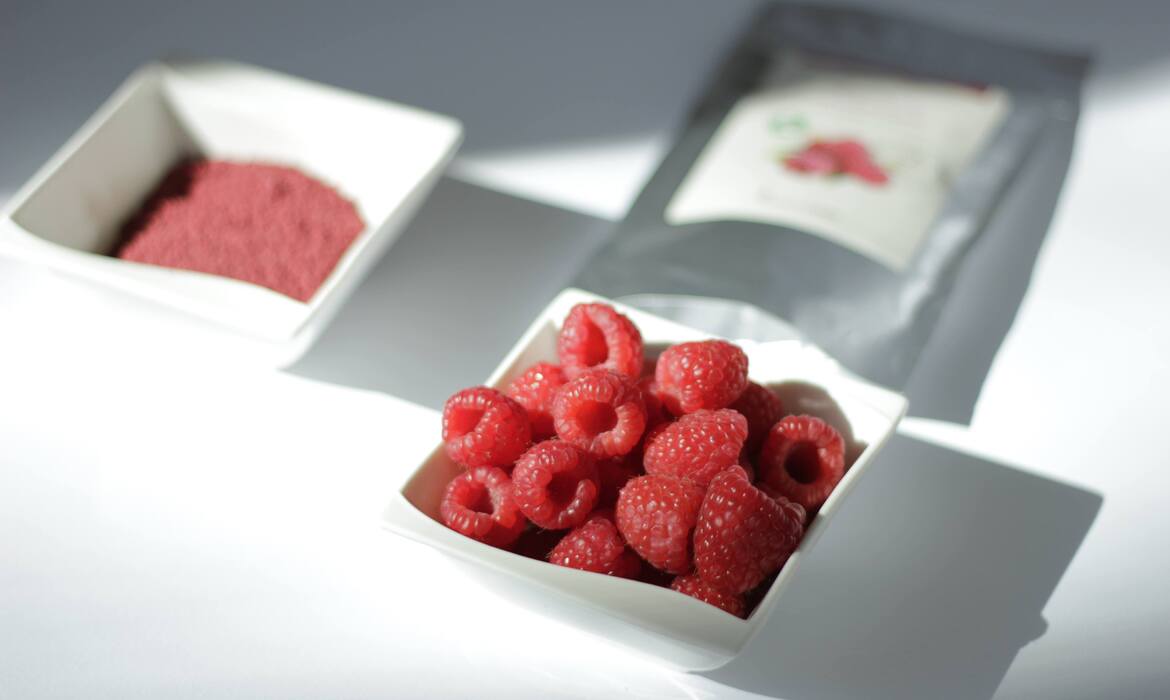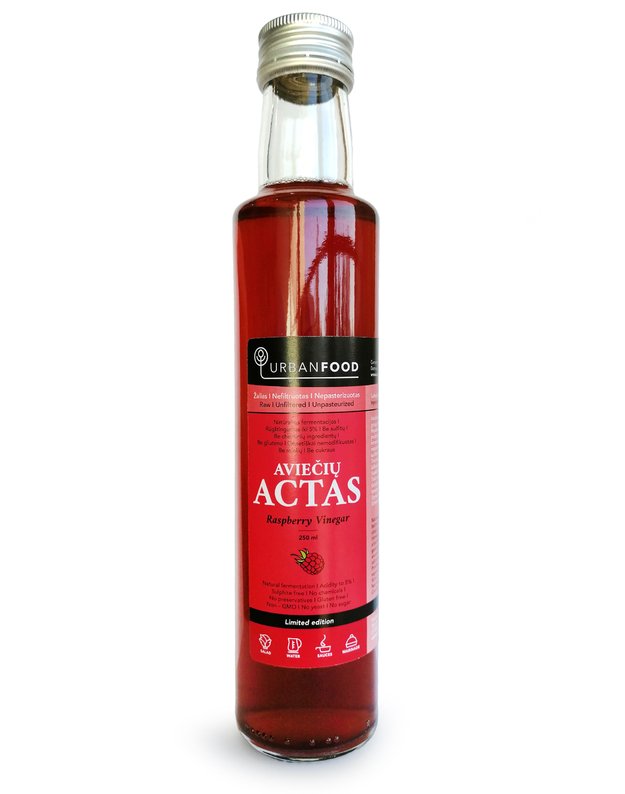
Raspberries are small, red berries with a sweet and sour flavour, rich in vitamins C and E and fibre. They are good for digestion, immunity and skin health. Raspberries are often eaten fresh and used for desserts, jams or juices.
Raspberries are not only tasty, but also highly nutritious, rich in vitamins, antioxidants and dietary fibre, which can help improve digestion, boost the immune system and contribute to healthy, glowing skin. The health benefits of raspberries are appreciated for their ability to contribute naturally to the body's well-being, making them ideal for everyday diets.
For those who want to enjoy the benefits of raspberries all year round, raspberry powder or vinegar are recommended as concentrated products that retain all the valuable properties of raspberries and are easy to adapt to the daily diet.

Raspberry vinegar, 250 ml - naturally fermented and unpasteurised, this vinegar adds a special flavour to salads, sauces or drinks and contributes to better digestion and a stronger immune system. Vinegar is rich in probiotics, which help to maintain a healthy intestinal microflora, and can be mixed with water as a refreshing drink.
Organic Raspberry Powder, 50-100 g or Raspberry Powder - ORGANIC, 50-100 g - 100% dried raspberries, retaining all vitamins and antioxidants. One teaspoon is equivalent to 100 g of fresh raspberries, making it a convenient way to enrich your diet with natural substances. The powder is perfect in smoothies, yoghurt or baked goods, giving a pink colour and a natural raspberry flavour.
Raspberry powder in a jar, 80 g, is a natural and organic product, perfect for those who want to enjoy the benefits of raspberries every day. Enriched with vitamins, minerals and antioxidants, this soft pink powder adds a special flavour to smoothies, smoothies, juices, yoghurt, cottage cheese or cereals. One teaspoon of this powder is equivalent to 100 g of fresh raspberries, making it a highly concentrated and convenient solution for raspberry lovers who want to enrich their diet naturally.
Free from sulphites, additives and GMOs, these products are a healthy and natural choice for everyday consumption.
The health benefits, possible side effects and culinary uses of raspberries, as well as tips on how to maximise their benefits and minimise their risks, are explored in this article, below.
Raspberries may have health benefits including improving the digestive system, protection against oxidative stress, weight management and bone health.
Raspberries are rich in essential nutrients, making them a valuable addition to any diet. Their high fibre content can help regular bowel movements and prevent constipation.
The antioxidants in these berries, such as anthocyanins and quercetin, can help protect the body against oxidative stress and inflammation, which can reduce the risk of chronic diseases.
Raspberries are also low in calories, making them an ideal snack for weight management. Their natural sweetness can satisfy cravings without the added sugar common in processed snacks.
Vitamins and minerals, including vitamin K and manganese, can support bone health and metabolism.
Possible side effects of raspberries may include gastrointestinal discomfort, allergic reactions, kidney stone formation and drug interactions.
Although raspberries are generally considered to be a safe and nutritious berry, their consumption can cause gastrointestinal discomfort, especially for those who consume large quantities.
Raspberries are rich in dietary fibre, which, if added to the diet too quickly or consumed in excess, can cause bloating, gas or diarrhoea.
People allergic to the berries may experience allergic reactions, which may include hives, swelling or respiratory problems.
Such persons should avoid raspberries to avoid adverse effects.
Raspberries contain natural compounds called oxalates, which may contribute to the formation of kidney stones in sensitive individuals.
Persons with a history of oxalate-related kidney stones should consult their doctor about raspberry consumption.
Raspberries may interact with certain medications, especially anticoagulants, due to their vitamin K content.
This interaction may affect blood clotting processes, so people taking such drugs should seek professional advice before significantly increasing their raspberry intake.
Raspberries contain 38 calories per 100 g.
Vitamins and minerals:
Antioxidants and water content:
These nutritional properties may contribute to a range of health benefits associated with raspberry consumption, including heart and digestive health and possible anti-cancer properties.
In order to include raspberries in your diet, it is advisable to consume one to two servings per day. A typical serving size is approximately one cup, which contains approximately 38 calories and is a rich source of dietary fibre, vitamins and antioxidants. This amount can help maintain digestive health, improve heart health and provide essential nutrients without excessive calories.
It is very important to assess your individual dietary needs and to consult your doctor if you have specific medical conditions or dietary restrictions. Raspberries can be enjoyed fresh, frozen or added to smoothies, salads and desserts.
Adding raspberries to your diet can increase their health benefits when combined with complementary foods and food supplements. Raspberries are rich in antioxidants, vitamins and dietary fibre, making them an excellent addition to a wide range of diets.
By improving their nutritional profile, their health benefits can be even greater.
To maximise the benefits of raspberries, consider the following combinations:
Such combinations not only enhance the taste of raspberries, but also create a synergistic effect that can increase the overall nutrient content.
Raspberries can help in weight loss efforts due to their low calorie and high fibre content.
The fibre can promote satiety by reducing overall calorie intake, while the natural sweetness of the fruit can quell cravings for unhealthy snacks.
The antioxidants in raspberries can support metabolic health.
However, for ideal weight control, raspberries need to be combined with a careful approach that includes regular physical activity and a complete diet.
Yes, there are known allergies to raspberries, although they are quite rare.
People who are allergic to raspberries may experience symptoms such as hives, swelling or gastrointestinal disturbances after eating them.
Persons suspected of having an allergy should consult a doctor for appropriate tests and treatment strategies to avoid possible allergic reactions.
Yes, raspberries can be frozen for later use, thus preserving their freshness and nutritional value for longer.
When stored properly, frozen raspberries can retain their quality for up to one year, making them a versatile ingredient for a wide range of culinary applications.